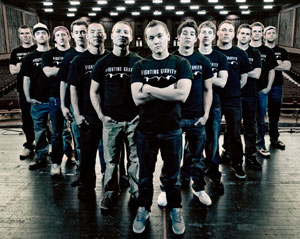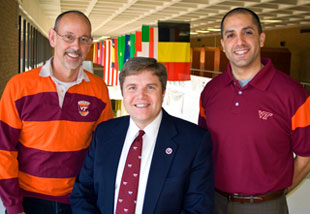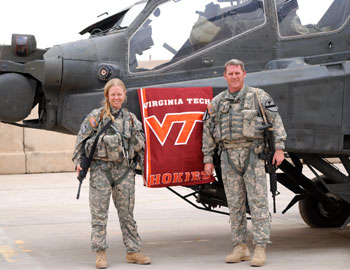 |
|
||||||
|
|
||||||||||||||||||||||||||||||||||||||||||||||||||||||||||||||||||||||||||||||||||||||||||||||||||||||
|
Fighting Gravity—and winning by CHAD O'KANE M.A. '11
The 13 Tech students and alumni who comprise the group have been on a roller coaster ride, including a third-place finish on NBC's "America's Got Talent," a successful nationwide tour, and a 2010 performance on "Dick Clark's New Year's Rockin' Eve with Ryan Seacrest" show. In February, the group returned to campus to perform. Watching them rehearse, one could see that the members—who were fraternity brothers at Tech—share a unique bond. In a true collaborative effort, each member offered input or griped at another member for missing a cue. Despite a lack of formal training, the members strive for perfection. "We think about this 24 hours a day, seven days a week," said Brett Sposa. "Because we're not professional dancers or choreographers, we have to work that much harder than everyone else."
While ambitious and focused, the performers are also realists. They understand the difficulty of attaining success in the entertainment industry and appreciate the value of a college education. "We plan to continue to plug away, finding fresh ways to make the show better," said Sposa. "We'll re-evaluate at the end of the summer, and if we don't think [the show] is going in the direction we want it to go, school will always be there. The worst thing that can happen is we'll have all of these wonderful experiences and then return to a school we love." Learn more at www.fightingravity.com. Chad O'Kane (M.A. communication '11) is a graduate assistant with Virginia Tech Magazine.
Educators transforming the high school experience
Three educators—Salem (Va.) City Schools Superintendent Alan Seibert (secondary education '91, Ed.D. educational leadership and policy studies '00), Salem High School Assistant Principal Scott Habeeb (B.A., M.A.Ed. curriculum and instruction '97), and English teacher Ray Moore (English '71)—have deemed this the "freshman problem." Prior to Seibert's appointment as superintendent, the trio worked together as educational consultants, co-authoring a book entitled The Ninth Grade Opportunity: Transforming Schools from the Bottom Up. The book is meant to provide schools throughout the United States a model for giving ninth-graders the skills necessary for moving from middle school to the more academically rigorous environment of high school, without sacrificing expectations. "Ninth-grade decisions have a long-term impact," Habeeb said. "Kids that age are not mature enough to grasp the magnitude of those decisions." Moore echoed that sentiment. "[Ninth-graders] are often not making the best decisions," he said. "But by this age, those decisions really do count." While the three men share a philosophy about education, a difficult challenge for the authors was to unite three distinct voices in one book. "One of the biggest challenges was attaining a common voice," Seibert said. "But we all have our area of expertise, and we're profoundly student-centered, so the book came together around that notion." Each credits his Virginia Tech roots as a bond that drew them together. "It didn't hurt that we're all Hokies," Seibert said. "It gave us plenty to talk about." As superintendent, Seibert has divested himself from the consulting team yet remains committed to ensuring that teachers and their students have the resources necessary to negotiate the rocky transition into high school. Habeeb and Moore continue their consulting work and have plans for a follow-up book about inspiring and connecting with students. Chad O'Kane (M.A. communication '11) is a graduate assistant with Virginia Tech Magazine.
Helicopter pilot cools her jets in Blacksburg
At Virginia Tech, she was one of only 23 Virginia Tech Corps of Cadets (VTCC) members in the College of Natural Resources and Environment (CNRE) and a female in the traditionally male-dominated corps. So it is little surprise to those who know her that she was one of a small number of women to ever pilot the AH-64 Apache, the Army's only attack helicopter. Described as a "star cadet" by former Virginia Tech Army ROTC commander Denny Cochrane, Reeves graduated with a commission to the Army and an appointment to flight school. She served two tours in Iraq, unperturbed by being a woman in a man's world. "Flying the Apache was like driving a Porsche," Reeves said. "It's an awesome experience. [The Apache] is lightning-quick in its responses." Reeves recognizes that her time at Virginia Tech—a blend of the corps and CNRE—was crucial to her success. "Much of what I learned in natural resources could be applied to military operations and was a big help to me in the Army and my aviation career," she said. Of her time in the corps, she also knows that cadets learn dependability and earn a well-deserved reputation for it. "When [cadets are given] something to do, they will take care of it." Now residing in Blacksburg, Reeves is purposefully slowing down from a "fast and furious career" to start a family. She's also serving on the VTCC board of directors, where her goals for the corps include increasing enrollment and continuing to recruit more women. She's just the right person for the job. After all, this is a woman who knows a thing or two about reaching new heights. Hillary May (English '12) is an intern with Virginia Tech Magazine. Lynn Matthews Davis, director of communications for the College of Natural Resources and Environment, contributed to this article. |
|
|||||||||||||||||||||||||||||||||||||||||||||||||||||||||||||||||||||||||||||||||||||||||||||||||||||
|
|
||||||||||||||||||||||||||||||||||||||||||||||||||||||||||||||||||||||||||||||||||||||||||||||||||||||




